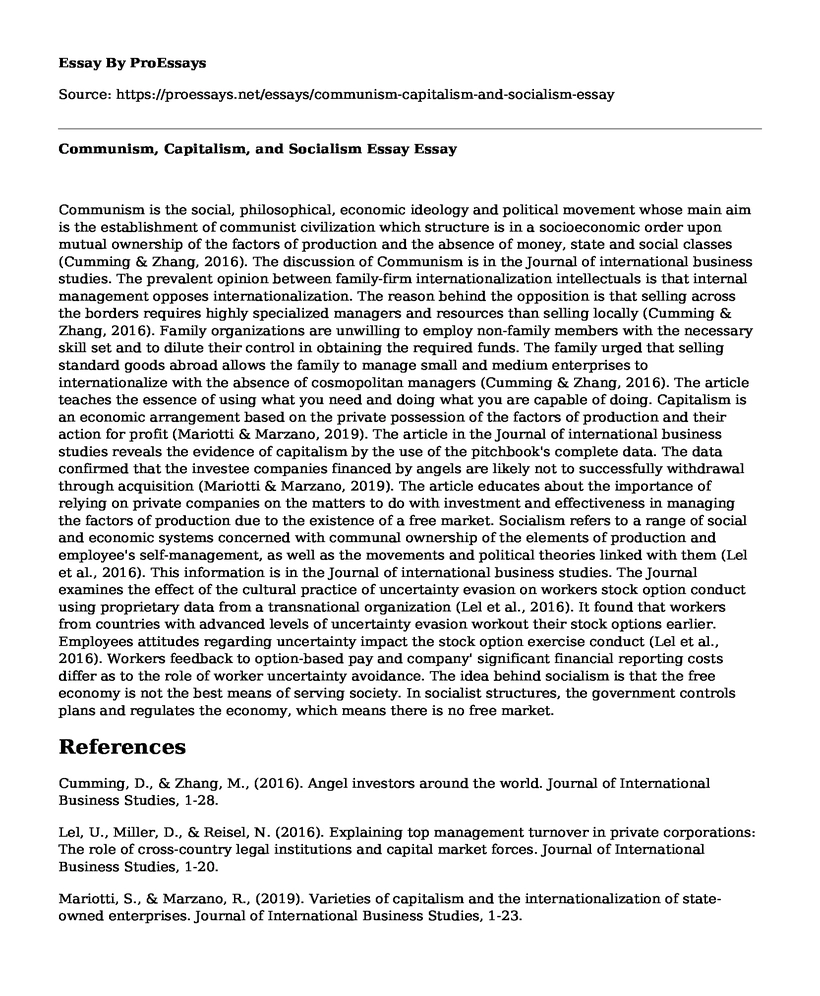Communism is the social, philosophical, economic ideology and political movement whose main aim is the establishment of communist civilization which structure is in a socioeconomic order upon mutual ownership of the factors of production and the absence of money, state and social classes (Cumming & Zhang, 2016). The discussion of Communism is in the Journal of international business studies. The prevalent opinion between family-firm internationalization intellectuals is that internal management opposes internationalization. The reason behind the opposition is that selling across the borders requires highly specialized managers and resources than selling locally (Cumming & Zhang, 2016). Family organizations are unwilling to employ non-family members with the necessary skill set and to dilute their control in obtaining the required funds. The family urged that selling standard goods abroad allows the family to manage small and medium enterprises to internationalize with the absence of cosmopolitan managers (Cumming & Zhang, 2016). The article teaches the essence of using what you need and doing what you are capable of doing. Capitalism is an economic arrangement based on the private possession of the factors of production and their action for profit (Mariotti & Marzano, 2019). The article in the Journal of international business studies reveals the evidence of capitalism by the use of the pitchbook's complete data. The data confirmed that the investee companies financed by angels are likely not to successfully withdrawal through acquisition (Mariotti & Marzano, 2019). The article educates about the importance of relying on private companies on the matters to do with investment and effectiveness in managing the factors of production due to the existence of a free market. Socialism refers to a range of social and economic systems concerned with communal ownership of the elements of production and employee's self-management, as well as the movements and political theories linked with them (Lel et al., 2016). This information is in the Journal of international business studies. The Journal examines the effect of the cultural practice of uncertainty evasion on workers stock option conduct using proprietary data from a transnational organization (Lel et al., 2016). It found that workers from countries with advanced levels of uncertainty evasion workout their stock options earlier. Employees attitudes regarding uncertainty impact the stock option exercise conduct (Lel et al., 2016). Workers feedback to option-based pay and company' significant financial reporting costs differ as to the role of worker uncertainty avoidance. The idea behind socialism is that the free economy is not the best means of serving society. In socialist structures, the government controls plans and regulates the economy, which means there is no free market.
References
Cumming, D., & Zhang, M., (2016). Angel investors around the world. Journal of International Business Studies, 1-28.
Lel, U., Miller, D., & Reisel, N. (2016). Explaining top management turnover in private corporations: The role of cross-country legal institutions and capital market forces. Journal of International Business Studies, 1-20.
Mariotti, S., & Marzano, R., (2019). Varieties of capitalism and the internationalization of state-owned enterprises. Journal of International Business Studies, 1-23.
Cite this page
Communism, Capitalism, and Socialism Essay. (2022, Feb 18). Retrieved from https://proessays.net/essays/communism-capitalism-and-socialism-essay
If you are the original author of this essay and no longer wish to have it published on the ProEssays website, please click below to request its removal:
- Impact of Educational and Drug Prevention Programs Essay
- Quebec Population Immigration and Employment Essay
- A Falling Society Essay Example
- Traveling to the Future or Past: Changing Experiences in Afghanistan Essay Example
- Social Imagination: A Key to Better Society - Essay Sample
- NY Gov Cuomo Unveils New Healthcare Access Program - Essay Sample
- Essay Sample on Healthcare Workers During This Covid-19







